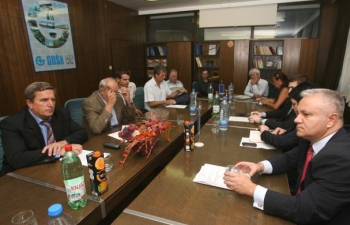- Serbia
Get to know Serbia
- Citizens
Culture and science
Health services
Pension and disability insurance
- Business
Employment
Economy
- Media
- Government
- Contact
Keep in touch
Contact form
Back
Keepin touch
Whether you have a question, comment, suggestion or any problem in the purview of the government, send us your message and we will try to respond as soon as possible. If your problem is not in our purview, we will forward your message to the relevant institution.
Q:
A:
Production in Gosa to be launched Monday
Smederevska Palanka,
17 August 2012
Minister of Finance and Economy Mladjan Dinkic and representatives of the management and the strikers’ board signed an agreement on ending the strike at the railcar factory Gosa in Smederevska Palanka, thanks to which all 450 employees will return to their job posts on Monday, 20 August.
Following a meeting with representatives of the union and company leadership, to whom he presented a concrete plan for launching the production and returning workers to their posts after a four-month strike without any salaries, Dinkic stated that the agreement signed today implies the payout of all past unpaid salaries.
The Minister announced that all employees will receive their salaries in three stages by the end of October, while the new salaries, which they will begin earning from Monday, will be fully paid out together with other mandatory allowances.
The government will make sure that Gosa is engaged in the overhaul of railcars for the Serbian railroad companies and will also contemplate the possibility of granting it a part of the production of railcars for Republika Srpska, in line with the inter-state agreement signed last year, so that next year we can have the first delivery of railcars to Republika Srpska.
Dinkic affirmed that he will talk with Belgrade Mayor Dragan Djilas about the possibility of Gosa performing the overhaul of trams in Belgrade.
He said that Smederevska Palanka has been declining ever since Gosa stopped operating, voicing his hope that the new measures will help to get the entire municipality back on its feet.
Gosa is one of the best railcar factories in Serbia and the region. We are aware of the fact that the situation is still dire, so we must continue working and resolving problems. The idea is to re-launch production in Gosa, but I am nevertheless aware that we must get the whole of Serbia moving, the Minister observed.
He voiced his hope that next time he visits Gosa, he will see halls full of workers and machines working at full throttle, unlike today.
He also noted that Gosa’s leadership has made a commitment to continue carrying out the jobs in other markets, such as Croatia and some EU states, in order to help the factory overcome the crisis it is in.
The next step will be to revive the production in the railcar factory in Kraljevo, Minivagonka in Nis, Smederevo-based Zelvoz and Zrenjanin-based Sinvoz, namely, all factories currently faced with business problems. The goal of all these measures is to secure work for several thousand people in the railcar industry in Serbia.
After the successful privatisation of Gosa in 2007, the new Slovak partner ZOS–Trnava invested over €6 million in the modernisation of the company.
After that, the production of Eanos freight railcars began, with a European quality standard, and within a short period buyers were delivered hundreds of railcars.
Gosa was one of the largest Serbian exporters, but because of the crisis and a lack of job deals it fell into difficulties, which is why the relevant Ministry is trying to find work for the factory and secure salaries to workers through a Programme of Support to Railcar Producers.
At the proposal of the Ministry of Finance and Economy, the government yesterday adopted this Programme to help stabilise production in this branch of industry.
The Minister announced that all employees will receive their salaries in three stages by the end of October, while the new salaries, which they will begin earning from Monday, will be fully paid out together with other mandatory allowances.
The government will make sure that Gosa is engaged in the overhaul of railcars for the Serbian railroad companies and will also contemplate the possibility of granting it a part of the production of railcars for Republika Srpska, in line with the inter-state agreement signed last year, so that next year we can have the first delivery of railcars to Republika Srpska.
Dinkic affirmed that he will talk with Belgrade Mayor Dragan Djilas about the possibility of Gosa performing the overhaul of trams in Belgrade.
He said that Smederevska Palanka has been declining ever since Gosa stopped operating, voicing his hope that the new measures will help to get the entire municipality back on its feet.
Gosa is one of the best railcar factories in Serbia and the region. We are aware of the fact that the situation is still dire, so we must continue working and resolving problems. The idea is to re-launch production in Gosa, but I am nevertheless aware that we must get the whole of Serbia moving, the Minister observed.
He voiced his hope that next time he visits Gosa, he will see halls full of workers and machines working at full throttle, unlike today.
He also noted that Gosa’s leadership has made a commitment to continue carrying out the jobs in other markets, such as Croatia and some EU states, in order to help the factory overcome the crisis it is in.
The next step will be to revive the production in the railcar factory in Kraljevo, Minivagonka in Nis, Smederevo-based Zelvoz and Zrenjanin-based Sinvoz, namely, all factories currently faced with business problems. The goal of all these measures is to secure work for several thousand people in the railcar industry in Serbia.
After the successful privatisation of Gosa in 2007, the new Slovak partner ZOS–Trnava invested over €6 million in the modernisation of the company.
After that, the production of Eanos freight railcars began, with a European quality standard, and within a short period buyers were delivered hundreds of railcars.
Gosa was one of the largest Serbian exporters, but because of the crisis and a lack of job deals it fell into difficulties, which is why the relevant Ministry is trying to find work for the factory and secure salaries to workers through a Programme of Support to Railcar Producers.
At the proposal of the Ministry of Finance and Economy, the government yesterday adopted this Programme to help stabilise production in this branch of industry.
-
 Požega, 5 July 2025
Požega, 5 July 2025Section of Pakovraće - Požega highway officially opened
-
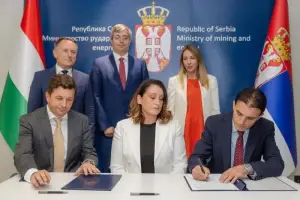 Belgrade, 2 July 2025
Belgrade, 2 July 2025Technical specifications defined for Serbia-Hungary oil pipeline
-
 Belgrade, 30 June 2025
Belgrade, 30 June 2025IMF confirms Serbia successfully implementing all agreed reforms
-
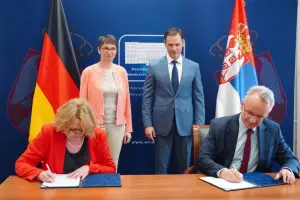 Belgrade, 27 June 2025
Belgrade, 27 June 2025Double Taxation Avoidance Agreement with Germany signed
-
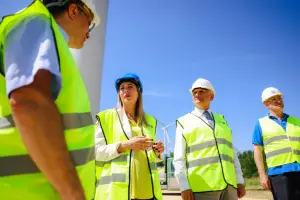 Kostolac, 25 June 2025
Kostolac, 25 June 2025Construction of Kostolac wind farm nearing completion
-
 Belgrade, 24 June 2025
Belgrade, 24 June 2025Government supports request for new postponement of sanctions against NIS
-
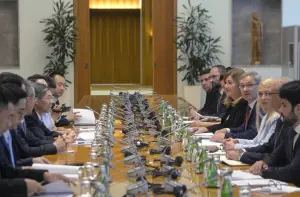 Belgrade, 23 June 2025
Belgrade, 23 June 2025Procedures to facilitate sale of Serbian products to China to be accelerated
-
 Belgrade, 21 June 2025
Belgrade, 21 June 2025Serbia receives first funds under Growth Plan for the Western Balkans
-
 Belgrade/Cairo, 20 June 2025
Belgrade/Cairo, 20 June 2025New phase in relations with Egypt in field of agriculture
-
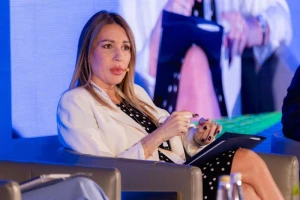 Belgrade/Athens, 18 June 2025
Belgrade/Athens, 18 June 2025Serbia’s leadership position in power sector

